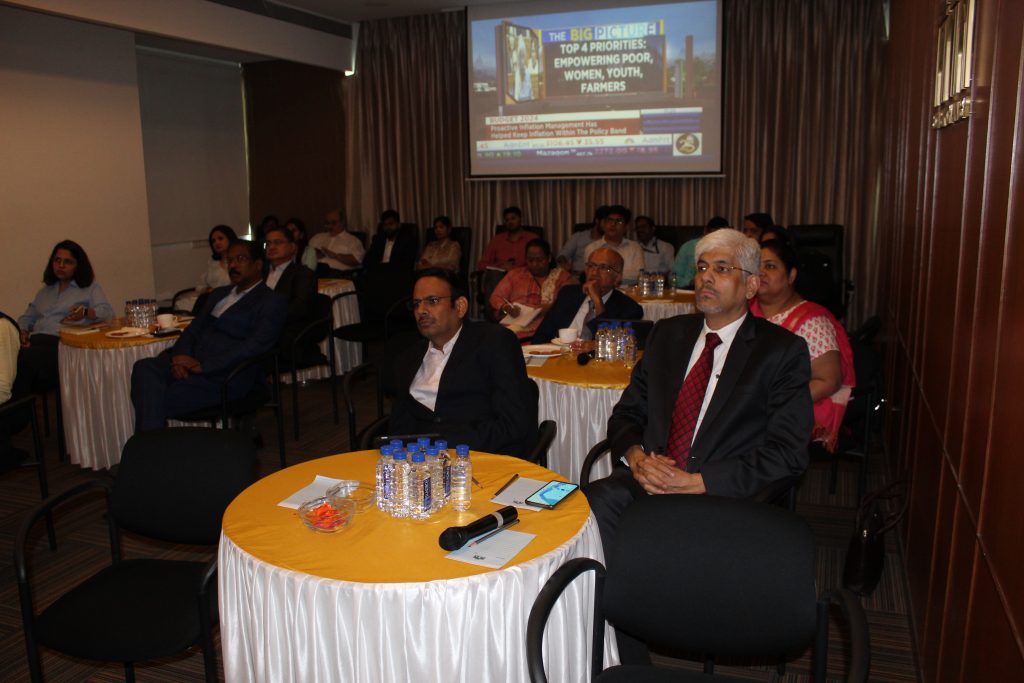Blog

Union Finance Minister Nirmala Sitharaman, in her sixth consecutive budget presentation, delivered the Interim Budget 2024-25, making history as the shortest budget speech ever at 58 minutes. The Finance Minister refrained from major announcements, reserving comprehensive policy details for the full-fledged budget slated for July, following the General Elections.
In her address, FM Sitharaman highlighted the government’s commitment to “First Develop India” (FDI), and introduced a more holistic concept of GDP, denoting Governance, Development, and Performance. She expressed the government’s dedication to achieving high growth in Gross Domestic Product alongside enhanced governance, development, and performance metrics. “Aligning with the ‘Panchamrit’ goals, our Government will facilitate sustaining high and more resource-efficient economic growth. This will work towards energy security in terms of availability, accessibility and affordability,” the Minister said in her budget speech.
Sharing his insights on the Interim Budget, Ritesh Tiwari, President, Bombay Chamber & CFO, Hindustan Unilever Limited and Unilever South Asia, said, “The interim budget presented was in line with expectations. The budget’s focus on infrastructure spends, incentives for rural development and the welfare of the poor is in the right direction, propelling India faster towards the goal of “Viksit Bharat” by 2047.”
Commenting on the interim budget announced today, Sandeep Khosla, Director General, Bombay Chamber of Commerce & Industry, said, “Finance Minister Nirmala Sitharaman has presented a short and balanced budget. While no major announcements have been made, as was expected, the budget places much emphasis on the need to ‘First Develop India’ (FDI) and on prioritising the poor, women, youth, and farmers, charting a transformative course. Further, with a substantial outlay of ₹11.11 lakh crores in FY25, constituting 3.4% of GDP, the emphasis on infrastructure spending not only enhances the broader economy but also catalyses long-term investment activity. This strategic approach aligns with the aggressive fiscal consolidation targets and positions India on a trajectory towards a $5 trillion economy, fostering growth and ensuring inclusive development.”
Nilesh Shah, MD, Kotak Mahindra AMC and former President Bombay Chamber observed, “The Vote on account is Citizen’s pride and Peers envy. It has achieved the impossible trinity of inclusive growth (through support to agriculture, rural housing, fisheries and micro finance for SHGs), infrastructure investment (enhanced allocation) and fiscal prudence.”

Bombay Chamber of Commerce & Industry invited several industry leaders to watch and share insights on the Budget in its Conference Hall in Mumbai today.
Sudhir Kapadia, Partner, Tax and Regulatory Services, Ernst & Young, stated, “The Finance Minister gave a very clear and strong signal of continuing with the path of physical, digital and social infrastructure development in the next five years. Some interesting announcements include rooftop solarisation of one crore households, a special housing scheme for middle class households, a one lac crore fund for extending long term financing at concessional rates for innovation projects and long-term interest free loans to states for tourism development. At the same time, by making no changes whatsoever in both direct and indirect tax rates, stability and certainty of tax regime is sought to be maintained. The FM has also reiterated her resolve to adhere to the fiscal deficit glide path and has budgeted a lower fiscal deficit of 5.1% of GDP in FY 24-25. Also, by projecting lower amounts of market borrowings next year, larger availability of credit for private sector investments is sought to be facilitated.”
He however, pointed out that one major wrinkle in the announcements is the surprising omission of extension of concessional tax rate of 15% for new manufacturing units set up beyond March 31, 2024. “Given the continued focus on PLIs for various sectors in manufacturing industries as well as the challenge of adequate job creation, it would have been better if this concessional tax rate was extended at least for a further two years,” he said.
Kunal Reshamwala, Associate Vice President, Taxation, IHCL (Indian Hotels Company) opined, “There is no tinkering with the tax proposal, just an extension; ITR6 (TAX RETURNS for the corporates) will be benefited in the coming Union Budget. Also the tourism sector has got a great support after the pandemic as government is taking huge initiative towards developing infrastructure i.e Port, Railways, Parks, etc.”
Hemant Tawde, Co-founder, Revti Industries, commented, “The Interim Budget has consistency in the thought process about the promises it has given to the industry. We are an MSME working in the sector of Energy, so looking forward to the full-fledged and bigger budget. The path seems correct, with government’s strategies about solar and other renewable sources of energy, the positives will come as a result of it.”
Prashant Deshpande, Legal Advisor, India Law Alliance shared his views, “On the indirect taxes front, GST is handled by the GST council, so there were no major expectations about what will happen in GST, except some of the unfulfilled recommendations made by the GST council. However, on the Customs front, there were two expectations. Whenever you are speaking about ease of doing business, you must keep in mind ease of doing export and import. Curtailing the time for custom clearance done in the last few years, the expectations are how ease of doing business is going to be implemented. Maybe the fine print will reveal that. The most important part of the budget is that the rates have been left unchanged. Because of this, there is going to be stability in decision making and strategic decisions. But, because there is no reference to Make in India scheme, we have to see in the fine print, what exact changes have been proposed, hopefully that initiative will be seen in the full-fledged budget.
Manish Balwani, Founder & MD, Value Creation Catalyst Services commented, “As this is an interim budget, significant changes to business perks and tax rates are not to be expected; the budget did maintain its focus on prioritising social expenditures and took a positive step forward. The government’s announcement that PPP in the agriculture sector will be promoted and facilitated has helped MSMEs get the backing of the Center.” He also commended the government’s emphasis on renewable energy, such as wind energy, solar electricity on rooftops, biogas, and the “No to Plastics” initiative. Furthermore, he observed that FDI will undoubtedly pour into states that receive loans and funding to enhance tourism attractions.
Key Highlights of the Interim Budget 2024-25:
- Outlay for infrastructure has been increased to ₹11.11 lakh crores in FY25, amounting to 3.4% of GDP.
- A corpus of ₹1 lakh crore will be established through a 50-year interest-free loan. This corpus is intended for long-term financing or refinancing, featuring low or negligible interest rates.
- Aggressive Fiscal Consolidation Target: Fiscal deficit target for FY25 set at 5.1%, surpassing expectations.
- FY24 fiscal deficit achieved at 5.8%, exceeding the target of 5.9% due to improved revenue mobilization.
- ‘Viksit Bharat’ by 2047: Emphasis on improving people’s capabilities and empowerment for national development.
- Number of airports doubled to 149. Expansion of existing airports and development of new airports to continue.
- Integration of 1361 mandis into the Electronic National Agriculture Market, benefiting 1.8 crore farmers with a trading volume of ₹3 lakh crore.
- Atmanirbhar Oil Seeds Abhiyan: Strategy to be formulated to achieve ‘atmanirbharta’ for oil seeds such as mustard, groundnut, sesame, soybean, and sunflower. This will cover research for high-yielding varieties, widespread adoption of modern farming techniques, market linkages, procurement, value addition, and crop insurance.
- Announcement of a ₹1 lakh crore corpus with interest-free loans for 50 years to boost long-term technological research.
- New scheme to be launched for strengthening deep-tech technologies for defence purposes.
- Encouragement for private sector involvement in research and innovation in sunrise sectors.
- Thirty crore Mudra Yojana loans have been disbursed to women entrepreneurs.
- Empowering women to contribute to economic growth and development.
- As a part of the solar energy emphasis, rooftop solarisation to ensure that approximately one crore households get up to 300 units of free electricity each month.
- Noteworthy achievements in direct tax collection, with a threefold increase over the last decade and a substantial rise in return filers.
- Withdrawal of outstanding direct tax demands up to ₹25,000 for the period up to FY 2009-10.
- Withdrawal of outstanding direct tax demands up to ₹10,000 for financial years 2010-11 to 2014-15, benefiting one crore taxpayers.
- Extension of tax benefits to Start-Ups, with investments made by Sovereign wealth funds or pension funds extended until 31.03.2025.
- Extension of tax exemption on certain income of IFSC units by a year, now valid until 31.03.2025, from the previous deadline of 31.03.2024.
Sitharaman reiterated the government’s commitment to inclusive and balanced growth, farmer-centric policies, income support, and the promotion of technologies through start-ups. The full-fledged budget in July is anticipated to provide further details on the comprehensive development agenda outlined in the Interim Budget.






